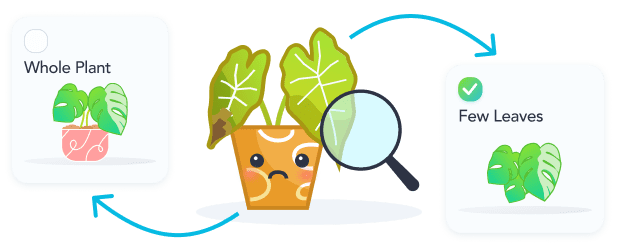Care Guides for Anthurium Forgetii
Every 7d
Recommended Frequency
1 /2 cup of water
Recommended Amount
Caring for an Anthurium forgetii requires understanding its watering needs. This plant thrives on a balance, avoiding both over and under-watering. Water every 7-10 days, adjusting based on humidity and temperatu...
Every 90d
Recommended Frequency
Caring for your Anthurium forgetii involves a specific fertilization routine to promote healthy growth and vibrant foliage. This plant benefits from a balanced approach to nutrient application, ensuring it receives all i...
Medium Light
Recommended
Anthurium forgetii thrives in bright indirect light. This means it should be placed about 5 feet away from a southern or western-facing window, ideally in front of a window with a sheer curtain to filter the sunlight. Th...
Every 730d
Recommended Frequency
As a professional botanist, I'd like to share some essential tips on repotting your Anthurium forgetii, a beautiful plant that requires specific care to thrive. Repotting is a crucial aspect of its care routine, ensuring...
Caring for an Anthurium forgetii requires attention to its temperature needs to mimic its natural habitat. The ideal temperature range for this plant is between 75 to 85 degrees Fahrenheit. This range supports its growth...
Recommended Soil
For Anthurium forgetii, a tropical plant that thrives in a humid environment, the recommended soil type is peat soil. This soil is particularly beneficial due to its acidic nature and high moisture retention capabilities...
Caring for an Anthurium forgetii requires understanding its native habitat to replicate those conditions as closely as possible, especially when it comes to humidity. This plant thrives in environments where the humidity...
Questions about Anthurium Forgetii
Anthurium forgetii is a stunning tropical plant known for its heart-shaped, velvety leaves that lack a sinus (the notch at the leaf base). Native to Colombia, it thrives in warm, humid environments, making it a popular c...

Toxicity of Anthurium Forgetii

Common Pests and Diseases
Bacterial Blight
Caused by the bacterium Xanthomonas axonopodis pv. dieffenbachiae, which thrives in high humidity and warm temperatures, leading to water-soaked lesions on leaves that eventually turn brown or black.
To manage bacterial blight, start by isolating the affected plant to prevent the spread. Remove and destroy all infected parts of the plant. Ensure good air circulation around your anthuriums and avoid overhead watering to keep the foliage dry. Using bactericides can be effective, but prevention is key. Maintain lower humidity levels and avoid crowding plants to improve air flow. Regularly inspect plants for early signs of infection to tackle issues promptly.

Related Plants














